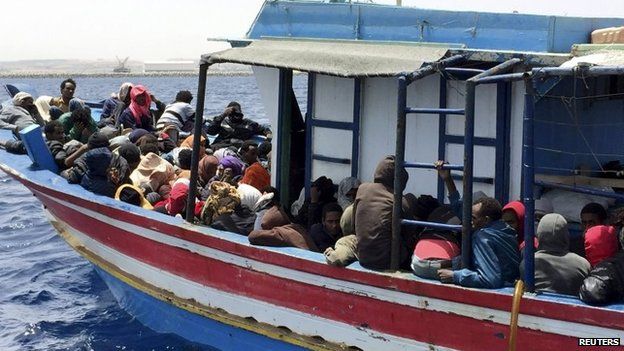Islamic State militants 'smuggled to Europe'
- Published

Islamic State (IS) fighters are being smuggled into Europe by gangs in the Mediterranean, an adviser to the Libyan government has told the BBC.
Abdul Basit Haroun said smugglers were hiding IS militants on boats filled with migrants.
Officials in Italy and Egypt have previously warned that IS militants could reach Europe by migrant boat.
However, experts have cautioned that it is very difficult to verify or assess such claims.
Mr Haroun based his claim on conversations with smugglers in parts of North Africa controlled by the militants.
He alleged that IS was allowing the boat owners to continue their operations in exchange for half of their income.
About 60,000 people are estimated to have tried to cross the Mediterranean this year, fleeing conflict and poverty. Since the 2011 uprising, Libya has been without a stable government, and the chaos has allowed trafficking networks there to thrive.
In an interview with BBC Radio 5 live Investigates, Mr Haroun said IS used the boats "for their people who they want to send to Europe, as the European police don't know who is from IS and who is a normal refugee or not".
These militants often sat separately from the other migrants, he said.
Migrants in numbers
- More than 1,800 people are feared to have died crossing the Mediterranean in 2015 so far - a 20-fold increase on the same period in 2014
- At least 218,000 reached Europe by the Mediterranean Sea in 2014, and about 60,000 have this year so far
- Italy received more than 170,000 of the 2014 arrivals, large numbers of which were from Syria and Eritrea
Source: The UN refugee agency; International Organization for Migration
Earlier this year, the EU's border control agency, Frontex, warned that it was "possible" that foreign fighters were using irregular migration routes to get into Europe.
Egypt's ambassador to the UK has warned of "boats full of terrorists" if the international community does not act, while the Italian government has expressed fears of militants infiltrating the boats, while emphasising that the boats are a humanitarian crisis.
However, experts have cautioned that both countries have an interest in influencing the international response to the Libya crisis, and that it is difficult to verify the threat without evidence.
"Egypt is particularly keen to amplify the threat of Islamic State in Libya as it is desperately seeking approval for international intervention in the country," Alison Pargeter, an analyst focusing on Libya for the Royal United Services Institute, a British defence think tank, told the BBC earlier this year.
Meanwhile, Christian Kaunert, an expert in terrorism and refugee issues at Dundee University, said the risk of militants infiltrating migrant boats was "plausible - but whether it's absolutely credible is difficult to assess because by definition, when those boats come in, they go unnoticed".
IS, which controls large parts of Iraq and Syria, has been active in recent months in Libya, exploiting a power struggle between rival groups after the fall of Col Muammar Gaddafi.
It is believed that local militias are often active partners with the smugglers, while Libya's coastguard has admitted to the BBC that they cannot handle the volume of migrant boats and will only interfere if a boat runs into trouble.
Rival groups in Libya